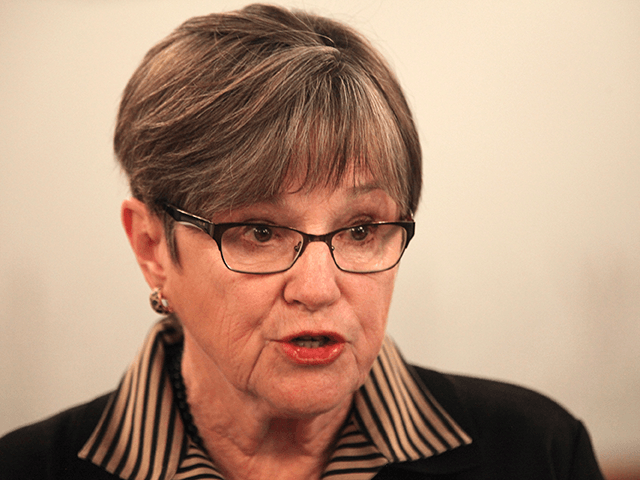The Democrat governor of Kansas vetoed two election integrity bills on Friday.
Kansas Gov. Laura Kelly (D-KS) claimed in identical statements released Friday accompanying the veto of both bills that they are “designed to disenfranchise Kansas voters”:
Although Kansans have cast millions of ballots over the last decade, there remains no evidence of significant voter fraud in Kansas. This bill is a solution to a problem that doesn’t exist. It is designed to disenfranchise Kansans, making it difficult to participate in the democratic process, not to stop voter fraud.
We also know what happens when states enact restrictive voting legislation. Hundreds of major companies across the nation have made it abundantly clear that this kind of legislation is wrong. Antagonizing the very business Kansas is trying to recruit is not how we continue to grow our economy.
House Bill 2183 addresses several election integrity issues, including, “prohibiting the receipt and expenditure of private moneys by election officials; directing the secretary of state to publish certain registered voter totals; relating to advance voting ballots by requiring signed statements for delivery of such ballots on behalf of a voter; limiting the number of such ballots that can be delivered; prohibiting the altering or backdating of the mailing date on such ballots; and requiring a matching signature on such ballots.” (emphasis added)
The language of the bill that prohibits private funding of election administration states:
No election official shall knowingly accept or expend any moneys, directly or indirectly, from any person [meaning any individual, corporation, partnership, company, organization, political party, political committee or any other private entity ], except as provided in any acts of appropriation or as otherwise provided by law, for any expenditures related to conducting, funding or otherwise facilitating the administration of an election pursuant to law.
Notably, this language is similar to the language used in the Georgia Election Integrity Act signed into law in that state by Georgia Gov. Brian Kemp (R-GA) on March 25 that prohibits county election officials from accepting unappropriated private funds but leaves the door open for appropriating entities–such as county commissions and the state legislature–to do so.
In contrast, Arizona Gov. Doug Ducey (R-AZ), signed an election integrity bill into law earlier this month that prohibits any county, municipal, or state government official or agency from accepting any private funding for election administration.
As Breitbart News reported in December, Facebook CEO and founder Mark Zuckerberg was a key player in the new and controversial practice of that private funding of election administration during the November 2020 presidential election:
A report released by the Amistad Project of the Thomas More Society at a press conference on Wednesday alleged Facebook founder Mark Zuckerberg and his wife made $419.5 million in contributions to non-profit organizations during the 2020 election cycle–$350 million to the “Safe Elections” Project of the Center for Technology and Civic Life (CTCL) and another $69.5 million to the Center for Election Innovation and Research–that, “improperly influence[d] the 2020 presidential election on behalf of one particular candidate and party.”
“The 2020 presidential election witnessed an unprecedented and coordinated public-private partnership to improperly influence the 2020 presidential election on behalf of one particular candidate and party. Funded by hundreds of millions of dollars from Facebook founder Mark Zuckerberg and other high-tech interests, activist organizations created a two-tiered election system that treated voters differently depending on whether they lived in Democrat or Republican strongholds,” Amistad Project Director Phill Kline wrote in the report’s executive summary.
The Kansas House of Representative passed the bill in an 80 to 42 vote, while the Kansas State Senate passed it 27-11.
House Bill 2332 also addresses several election integrity issues, including, “Prohibiting the modification of election laws other than by legislative process, requiring county election officials to maintain residential and mailing addresses for registered voters, and requiring identification of the sender on third party solicitations to registered voters to file an application for an advance voting ballot and prohibiting such solicitations by nonresidents of this state.” (emphasis added)
The Kansas State House of Representatives passed the bill 83–38, while the Kansas State Senate passed it 27–11.
In Kansas, a governor’s veto can be overridden with a two-thirds vote in each house of the Kansas State Legislature. The margin by which HB 2332 passed prior to the governor’s veto exceeded that requirement in both houses. The margin by which HB 2183 passed in the Kansas State Senate also exceeded that two-thirds requirement, while it was narrowly under that margin in the Kansas House of Representatives.
Kelly was elected governor in 2018 when she defeated the Republican nominee, Kris Kobach, by a 48 percent to 43 percent margin. Independent candidate Greg Orman received 6.5 percent of the vote.
Kelly is up for reelection in 2022.

COMMENTS
Please let us know if you're having issues with commenting.